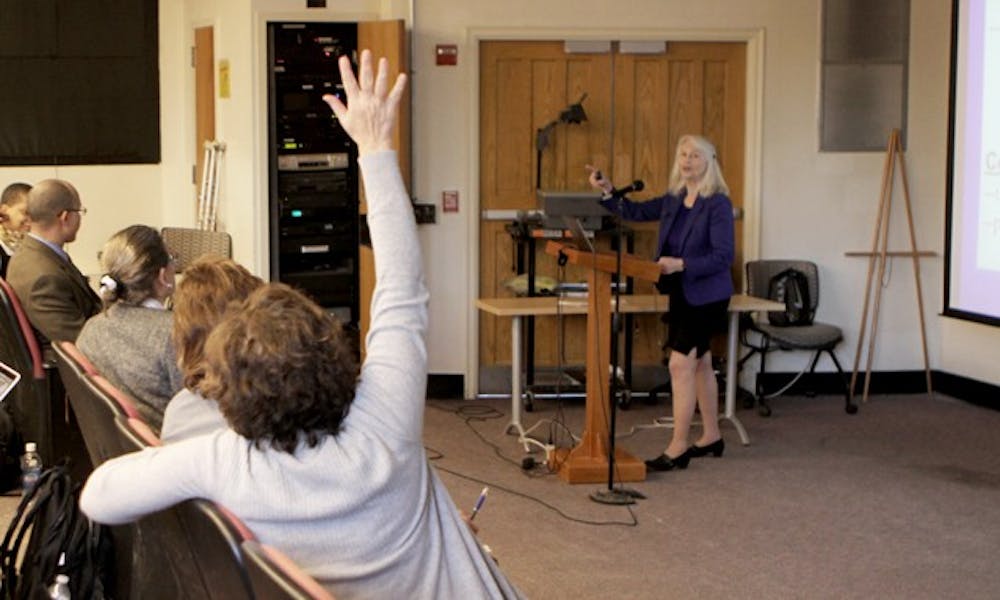Despite plans to vote, the Arts and Sciences Council is still undecided in making changes to the Quantitative Studies requirement.
Members of the Arts and Sciences Council tabled a proposal that suggests amending the Quantitative Studies requirement Thursday evening, deciding that QS Requirement Review Committee should amend the proposal in time for council’s January meeting. The proposal would mandate that students in Trinity College of Arts & Sciences fulfill one of their two QS credits through a course offered by a QS department—either the mathematics, statistics or computer science department. The current model allows students to take both of their QS courses in any academic department. This proposal is the first attempt to re-evaluate the Trinity requirements’ Areas of Knowledge since the adoption of Curriculum 2000.
“The proposal provides a delicate balance between creation of new classes across disciplines while not losing the fundamental definition of what an Area of Knowledge is,” said Jack Bookman, QS Requirement Review Committee chair and associate professor of the practice of mathematics.
Departments such as sociology and political science have historically offered classes with QS classifications, making it conceivable for students to avoid quantitate studies departments such as mathematics, statistics or computer science in completing the QS requirement.
Several members said they questioned the necessity of this policy’s reform. Students’ avoidance the three QS departments is not currently a problem, said Emily Klein, senior associate dean at the Nicholas School of the Environment and Earth Sciences and professor of geology and director of undergraduate studies in earth and ocean sciences. According to the QS Requirement Review Committee Report April 27, just 4.1 to 4.8 percent of the Class of 2011 had not met the QS requirements without having taken courses in at least one of the three disciplines.
Some faculty members said they were concerned about the restriction to specific departments. J. Lorand Matory, director of the Center for African and African American Research and Lawrence Richardson, professor of cultural anthropology, said that endorsing this proposal would set a precedent of establishing specific departments as most capable of teaching certain skills or concepts.
“It’s contradictory for a university so set on being interdisciplinary and liberal to designate one or two departments as being uniquely qualified,” Matory said.
Others said they were concerned that the learning objectives—set down by the QS Requirement Review Committee—would still not be met with the new proposal. Daniel Scheirer, associate dean of Trinity College and director of the Office of Health Professions Advising, noted that the proposal does not address a mechanism to guarantee that the two courses cover all of the objectives of the QS requirement.
Supporters of the proposal argued that it does provide guidelines to ensure that students receive baseline education in quantitative thinking. Clark Bray, assistant professor of the practice of mathematics, added that revamping the current QS requirement is in line with providing an interdisciplinary education in offering students who are not natural science majors—and would most likely not take classes from the mathematical and science departments—the opportunity to broaden their study of interest.
“For the most part, students’ general level of QS comprehension is not at the level that it should be,” said Steffen Bass, associate professor of physics. “The proposal on the table is probably the best path for students to get a interdisciplinary education, which is at the core of Duke’s beliefs.”
Council Chair Ruth Day, associate professor of psychology, suggested a full curriculum review to the council, adding that the council’s executive committee recommends that the council examine other Trinity requirements and codes at future meetings.
“This re-evaluation of the Quantitative Studies is helpful in perhaps showing [the council] how to assess the other codes and examine how students are responding to and fulfilling those requirements,” Day noted.
In other business:
The council unanimously approved a new major in the Department of Romance Studies. The major allows students to combine two romance languages into one major. Possible combinations include a French and Italian studies, French and Spanish studies or Italian and Spanish studies major. Requirements for the major include five major-level courses in each of the two languages, in addition to two international or experiential learning experiences related to students’ fields of Romance study.
“The particular strengths [of this new major] are that it not only fosters advanced proficiency in two languages but [that it] is also necessary in a world in which plurilingualism is becoming a norm,” said Ingeborg Walther, associate dean of Trinity College and director of the Office of Curriculum and Course Development.
Get The Chronicle straight to your inbox
Signup for our weekly newsletter. Cancel at any time.

